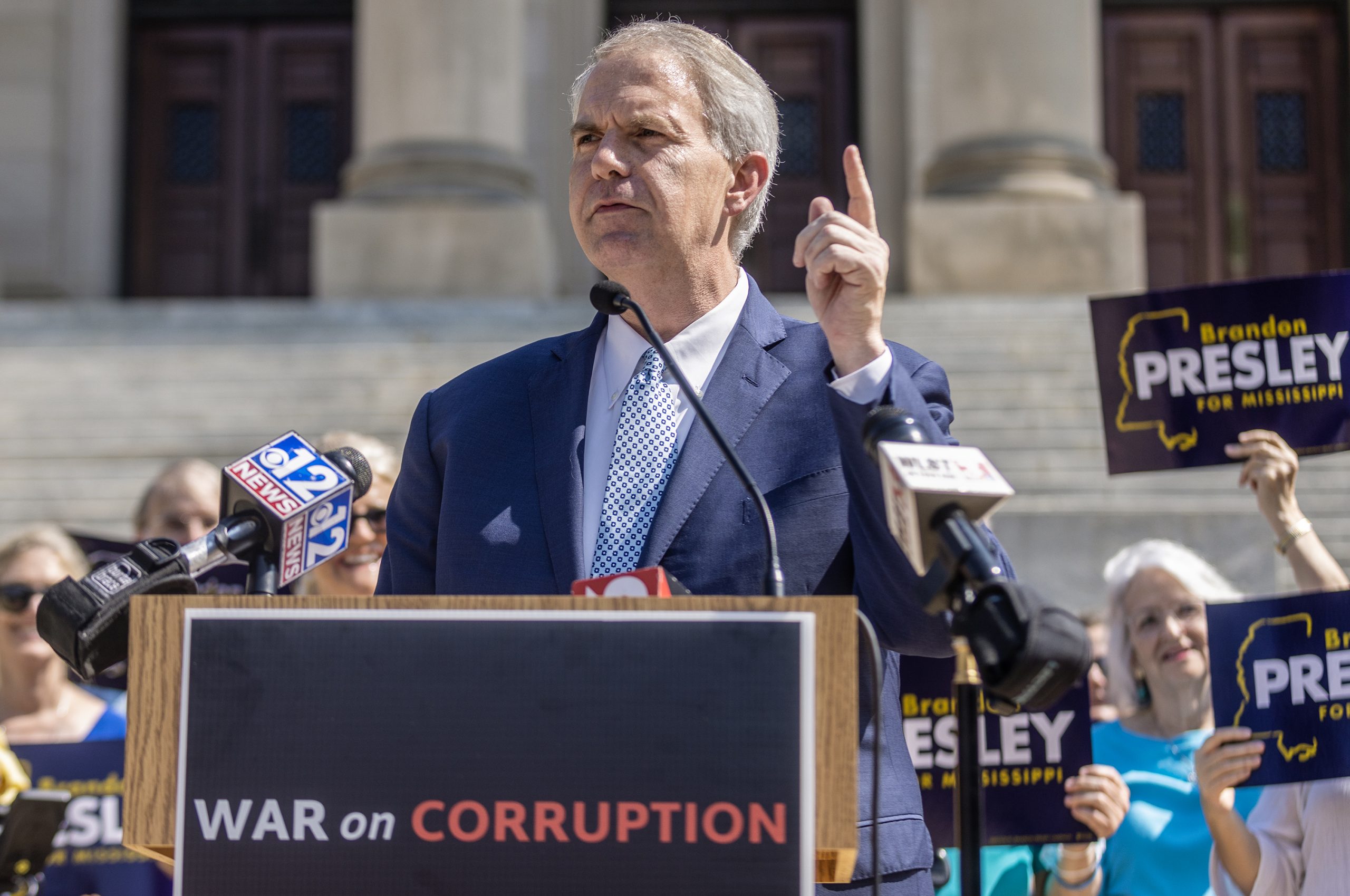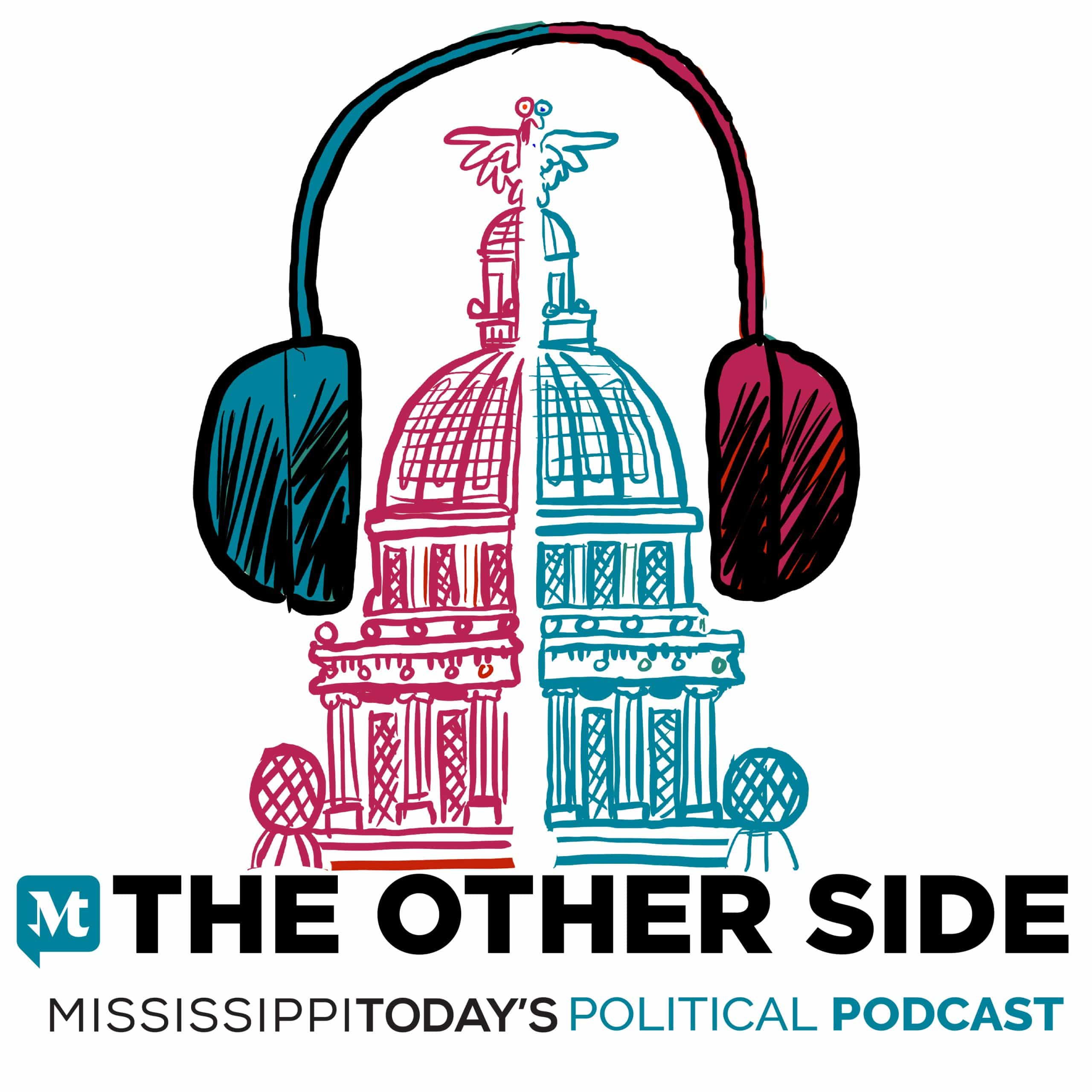Mississippi Today
Brandon Presley calls for independent investigator to examine welfare scandal

GULFPORT — Democratic gubernatorial candidate Brandon Presley called Tuesday for a new investigator to scrutinize Mississippi's massive welfare scandal and continued to hammer Republican Gov. Tate Reeves' lack of support to reform the state's welfare agency.
Presley, the state's Northern District Public Service commissioner, told reporters in Gulfport on Tuesday that, if elected to the state's highest office, he would urge the Mississippi Ethics Commission to appoint the independent inspector who would operate freely of political pressure from state lawmakers and the governor.
“I promise that I won't insert myself into this investigation,” Presley said.
It's unclear what exact duties the hypothetical investigator would have or what the scope of a potential inquiry would be, but Presley told the media he would want the person to have wide leeway to “do what they think” is best to conduct the review.
The four-term utilities regulator has made the multi-million dollar scandal that has led to multiple people pleading guilty to federal and state charges one of the primary focuses of his bid for the Governor's Mansion.
READ MORE: Brandon Presley unveils ethics package, slams governor for welfare scandal
One of the likely reasons the Democratic candidate is pitching the need for a new investigator is to contrast himself with Reeves' involvement in deciding which attorneys should handle the state's ongoing civil lawsuit to recoup allegedly misspent welfare funds.
Reeves' administration last year abruptly fired Brad Pigott, a former federal prosecutor who initially handled the state's civil lawsuit against dozens of defendants. The governor said he approved Pigott's termination after the former prosecutor filed a subpoena on the University of Southern Mississippi Athletic Foundation.
“When that former U.S. attorney got just a little bit too close to Tate's buddies and started asking just a little bit too tough of questions and started looking at what really was the deep infection of this corruption, he woke up the next day fired,” Presley said Tuesday.
The other major item that the Presley pushed was encouraging representatives from three state agencies to form a public integrity task force to primarily examine state contracts the Department of Human Services awards to its vendors — one of the root causes of the welfare scandal.
While the Democratic candidate is pitching new ethics reform policies, he's also accusing Reeves, his presumptive Republican opponent in November, of idly letting the scandal play out while he presided over the state Senate as lieutenant governor for eight years.
“You can write this down and put it in concrete,” Presley said. “Tate Reeves will not fight corruption. Let me say it again. Tate Reeves will not fight corruption. He's not opened his mouth about corruption in this campaign. He's not said a word.”
Reeves has maintained he did not know about the welfare scandal when he was lieutenant governor and played no part in the diversion of welfare funds.
READ MORE: Gov. Tate Reeves inspired welfare payment targeted in civil suit, texts show
In a recent campaign ad, Reeves re-used footage from his 2019 bid for the Governor's Mansion of him visiting the now-defunct New Summit School that was owned by Nancy New, a principal figure who has pleaded guilty to charges stemming from the welfare scandal.
Presley criticized the governor's decision to use campaign footage of a the private school and called New Summit School the “Chernobyl” of the sprawling welfare scandal, comparing it to the 1980s nuclear plant disaster in Russia.
The Reeves campaign did not address questions from Mississippi Today about the campaign video and other accusations from Presley, but in response, a Reeves campaign spokesperson labeled Mississippi Today as a “liberal Democrat SuperPAC.”
“No one in Mississippi should endure any lecture on government ethics from Brandon Presley while he is funding his campaign with money from a convicted felon found guilty of attempting to bribe elected officials across Mississippi,” Reeves' campaign manager Elliott Husbands said in a statement.
Husbands later clarified he was referring to Dickie Scruggs, a disbarred attorney who pleaded guilty to a federal bribery charge and a federal mail fraud charge in 2009. He served a stint in prison, which he completed in 2014.
The prominent former attorney donated $10,000 to Presley's campaign, according to the candidates' campaign finance report, and he regularly donates to political candidates in the state.
The Tuesday press conference was the second event the utilities regulator has conducted about tightening ethics rules and reforming lobbying laws in state government. He's expected to unveil more proposals in the coming weeks.
Editor's note: Dickie Scruggs has been a donor of Mississippi Today. Donors do not influence Mississippi Today's editorial decisions, and a list of our donors can be found here.
This article first appeared on Mississippi Today and is republished here under a Creative Commons license.
Did you miss our previous article…
https://www.biloxinewsevents.com/?p=244240
Mississippi Today
Podcast: The controversial day that Robert Kennedy came to the University of Mississippi

Retired U.S. Bankruptcy Judge Edward Ellington talks with Mississippi Today's Bobby Harrison and Geoff Pender about former U.S. Attorney General Robert Kennedy's speech at the University of Mississippi less than four years after the riots that occurred after the integration of the school. Ellington, who at the time headed the Ole Miss Speaker's Bureau as a law school student, recalls the controversy leading up to the speech.
This article first appeared on Mississippi Today and is republished here under a Creative Commons license.
Did you miss our previous article…
https://www.biloxinewsevents.com/?p=359978
Mississippi Today
On this day in 1961
MAY 20, 1961

A white mob of more than 300, including Klansmen, attacked Freedom Riders at the Greyhound Bus Station in Montgomery, Alabama. Future Congressman John Lewis was among them.
“An angry mob came out of nowhere, hundreds of people, with bricks and balls, chains,” Lewis recalled.
After beating on the riders, the mob turned on reporters and then Justice Department official John Seigenthaler, who was beaten unconscious and left in the street after helping two riders.
“Then they turned on my colleagues and started beating us and beat us so severely, we were left bloodied and unconscious in the streets of Montgomery,” Lewis recalled.
As the mob headed his way, Freedom Rider James Zwerg said he asked for God to be with him, and “I felt absolutely surrounded by love. I knew that whether I lived or died, I was going to be OK.”
The mob beat him so badly that his suit was soaked in blood.
“There was nothing particularly heroic in what I did,” he said. “If you want to talk about heroism, consider the Black man who probably saved my life. This man in coveralls, just off of work, happened to walk by as my beating was going on and said ‘Stop beating that kid. If you want to beat someone, beat me.' And they did. He was still unconscious when I left the hospital.”
To quell the violence, Attorney General Robert Kennedy sent in 450 federal marshals.
This article first appeared on Mississippi Today and is republished here under a Creative Commons license.
Mississippi Today
2024 Mississippi legislative session not good for private school voucher supporters
Despite a recent Mississippi Supreme Court ruling allowing $10 million in public money to be spent on private schools, 2024 has not been a good year for those supporting school vouchers.
School-choice supporters were hopeful during the 2024 legislative session, with new House Speaker Jason White at times indicating support for vouchers.
But the Legislature, which recently completed its session, did not pass any new voucher bills. In fact, it placed tighter restrictions on some of the limited laws the state has in place allowing public money to be spent on private schools.
Notably, the Legislature passed a bill that provides significantly more oversight of a program that provides a limited number of scholarships or vouchers for special-needs children to attend private schools.
Going forward, thanks to the new law, to receive the vouchers a parent must certify that their child will be attending a private school that offers the special needs educational services that will help the child. And the school must report information on the academic progress of the child receiving the funds.
Also, efforts to expand another state program that provides tax credits for the benefit of private schools was defeated. Legislation that would have expanded the tax credits offered by the Children's Promise Act from $8 million a year to $24 million to benefit private schools was defeated. Private schools are supposed to educate low income students and students with special needs to receive the benefit of the tax credits. The legislation expanding the Children's Promise Act was defeated after it was reported that no state agency knew how many students who fit into the categories of poverty and other specific needs were being educated in the schools receiving funds through the tax credits.
Interestingly, the Legislature did not expand the Children's Promise Act but also did not place more oversight on the private schools receiving the tax credit funds.
The bright spot for those supporting vouchers was the early May state Supreme Court ruling. But, in reality, the Supreme Court ruling was not as good for supporters of vouchers as it might appear on the surface.
The Supreme Court did not say in the ruling whether school vouchers are constitutional. Instead, the state's highest court ruled that the group that brought the lawsuit – Parents for Public Schools – did not have standing to pursue the legal action.
The Supreme Court justices did not give any indication that they were ready to say they were going to ignore the Mississippi Constitution's plain language that prohibits public funds from being provided “to any school that at the time of receiving such appropriation is not conducted as a free school.”
In addition to finding Parents for Public Schools did not have standing to bring the lawsuit, the court said another key reason for its ruling was the fact that the funds the private schools were receiving were federal, not state funds. The public funds at the center of the lawsuit were federal COVID-19 relief dollars.
Right or wrong, The court appeared to make a distinction between federal money and state general funds. And in reality, the circumstances are unique in that seldom does the state receive federal money with so few strings attached that it can be awarded to private schools.
The majority opinion written by Northern District Supreme Justice Robert Chamberlin and joined by six justices states, “These specific federal funds were never earmarked by either the federal government or the state for educational purposes, have not been commingled with state education funds, are not for educational purposes and therefore cannot be said to have harmed PPS (Parents for Public Schools) by taking finite government educational funding away from public schools.”
And Southern District Supreme Court Justice Dawn Beam, who joined the majority opinion, wrote separately “ to reiterate that we are not ruling on state funds but American Rescue Plan Act (ARPA) funds … The ARPA funds were given to the state to be used in four possible ways, three of which were directly related to the COVID -19 health emergency and one of which was to make necessary investments in water, sewer or broadband infrastructure.”
Granted, many public school advocates lamented the decision, pointing out that federal funds are indeed public or taxpayer money and those federal funds could have been used to help struggling public schools.
Two justices – James Kitchens and Leslie King, both of the Central District, agreed with that argument.
But, importantly, a decidedly conservative-leaning Mississippi Supreme Court stopped far short – at least for the time being – of circumventing state constitutional language that plainly states that public funds are not to go to private schools.
And a decidedly conservative Mississippi Legislature chose not to expand voucher programs during the 2024 session.
This article first appeared on Mississippi Today and is republished here under a Creative Commons license.
-
Our Mississippi Home6 days ago
Beat the Heat with Mississippi’s Best Waterparks
-
SuperTalk FM3 days ago
State auditor cracking down on Mississippians receiving unemployment benefits
-
Mississippi News Video6 days ago
Jackson has a gang problem
-
Kaiser Health News6 days ago
Medicaid ‘Unwinding’ Decried as Biased Against Disabled People
-
Local News3 days ago
Family files lawsuit after teen’s suicide in Harrison County Jail
-
Mississippi Today4 days ago
On this day in 1950
-
228Sports6 days ago
George County Pours Runs In 6A South State Title Victory At PRC
-
Our Mississippi Home2 days ago
Deer Fly Season on the Coast – Oh My!











































